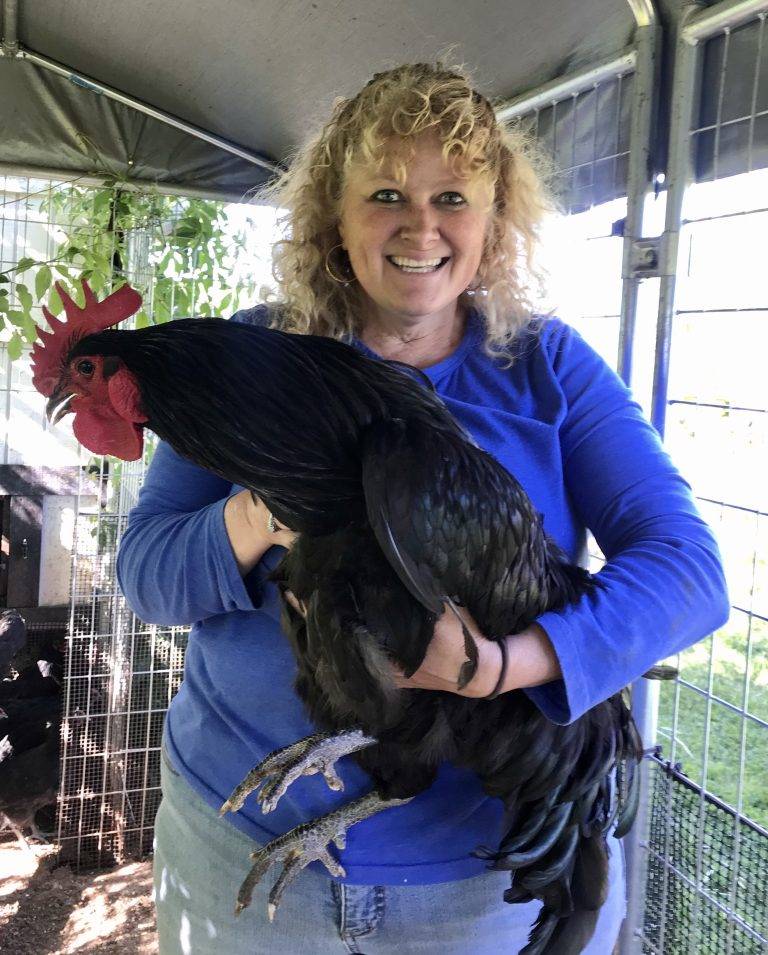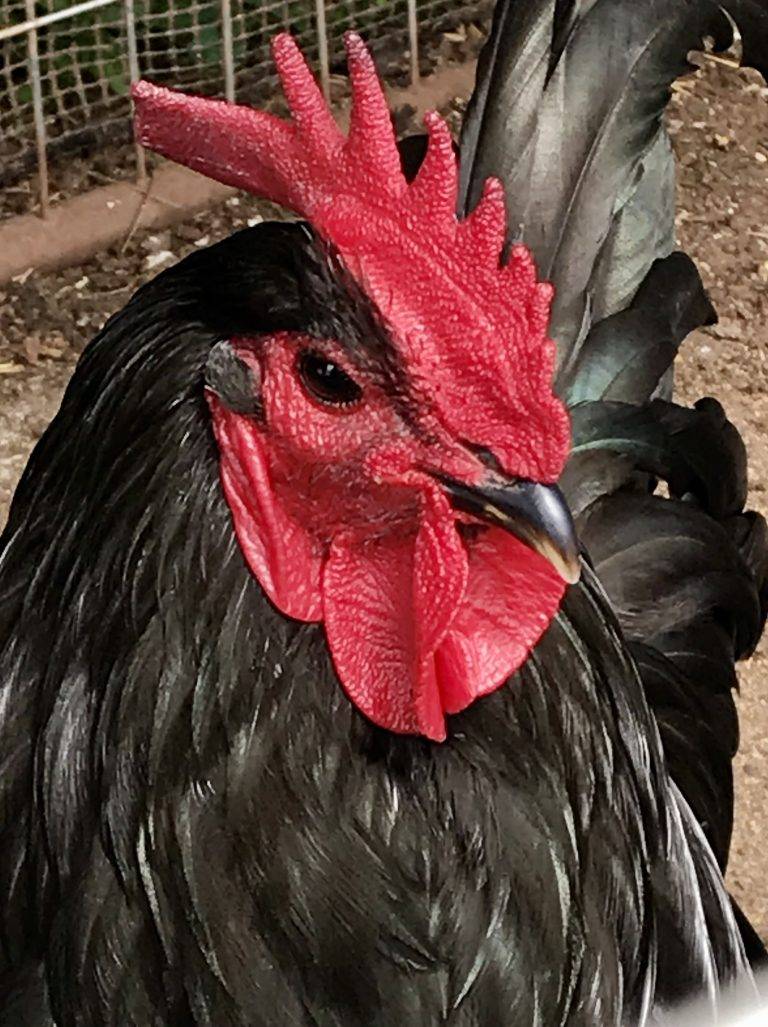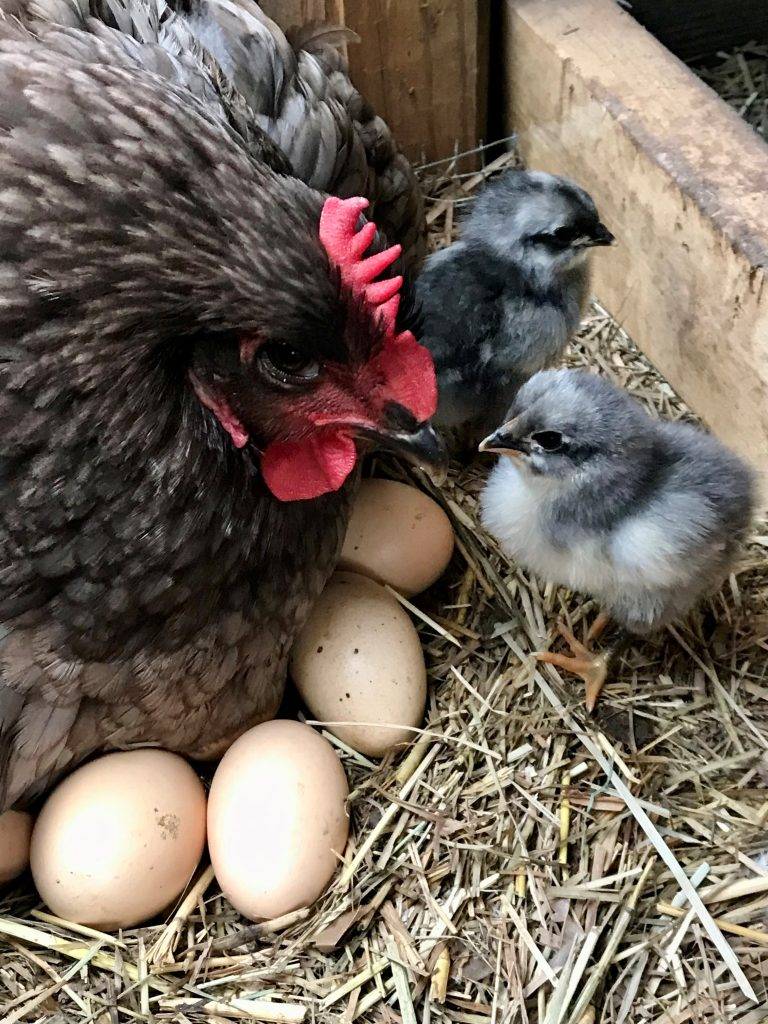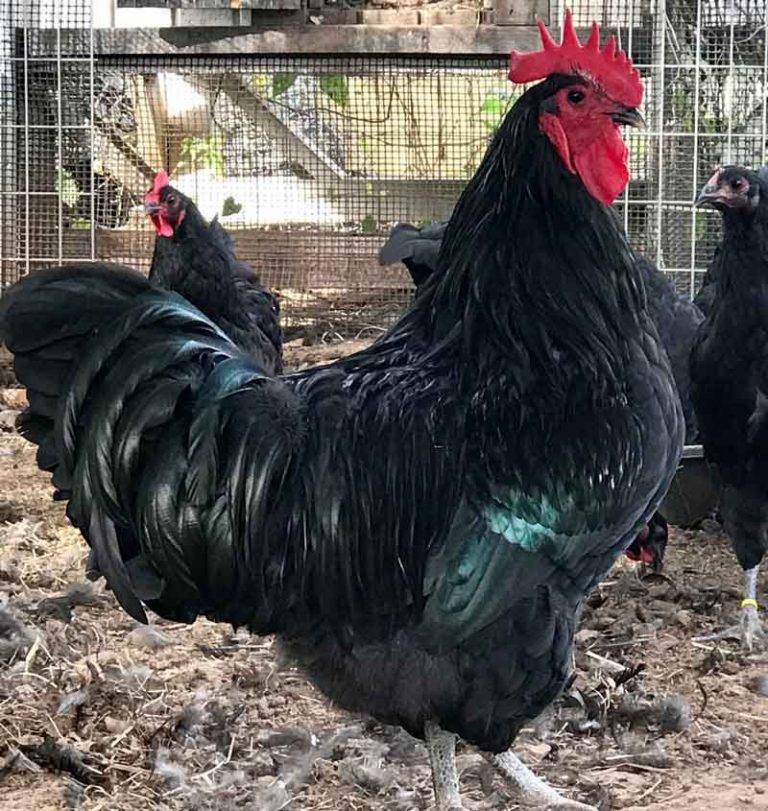Our Flock of Jersey Giants
We started our flock of Jersey Giants from breeder-sourced birds. Yes, there is a difference! Hatchery stock, while fine for most back-yard flocks, are not always true to the breed standard and some even have other kinds of chickens mixed in the gene pool. While we do not show our birds (yet), we strive to perfect our flock as depicted in the ABA Standards of Perfection.
With this in mind, our Black Jersey Giant’s genetics go back to some of the best breeders in Indiana, Pennsylvania, Ohio and Virginia. And we aren’t done! With each generation we continue to breed only the best and cull the others. Striving for the largest and best we can get.
Our flock of Blue Jersey Giants is just getting started, and we’re excited to see how they develop.

About JERSEY GIANTS

Jersey Giants generally are gentle birds and roosters are rarely aggressive, which is great because you don’t want anything that large to be mean! While the roosters can grow to be 15-18 pounds, they are slow growers and do not achieve their full size for two to three years. Hens are not nearly as large as the roosters. Hens are roughly the size of an Australorp and the two breeds are often confused. However, you will know the difference if you pick up a Jersey Giant hen. For all that she looks to be the same size, she will be heavier than the Australorp by a pound or two generally weighing in at 8-10 pounds.
Jersey Giants come in Black, Blue, White and Splash. We only raise Black and Blue at this time. The Black Jersey Giants have a beautiful beetle green sheen in the sunlight. They are the true representation of the standard, often getting the most size. The Blue Jersey Giants are beautiful and we are breeding our blues to achieve a nice darker laced feather. Both colors of Jersey have thick grey legs with yellow on the bottom of their feet.
We are firm believers in letting folks know what they are getting into, so here are the facts:
The benefits of Jersey Giants are that they are:
- Sustainable meat birds and great egg layers
- Heritage breed
- Not prone to health issues
- Cold-hardy
- Large enough to feed a family
The cons include:
- Slow maturity rate.
- They require proportionately more feed (unless you free range)
Jersey giants: Dual Purpose breed
Eggs, eggs and more eggs!
Before starting our Jersey Giant flock, we raised a variety of hatchery chicks of various breeds that are touted as being “layers”. These included Black Australorp, Rhode Island Reds, Production Reds, Barred Rocks, Columbian Rocks and White Leghorns. I was concerned when we decided to focus on the Jerseys that we would not have enough eggs. Boy, I was wrong! With the exception of the Leghorns, the Jersey Giants have out-laid all the other breeds of chickens; even during the winter months. The pullets start laying around 6 to 7 months.
Because Jerseys are a heritage breed of chicken, they maintain their qualities through natural mating. Meaning the large brown eggs will result in chicks with the same genetic makeup. However, the true “sustainability” that many homesteaders seek would only be as good as the broody chicken willing to sit on eggs. And, boy, do these hens like to sit on eggs! While we collect our eggs daily and incubate the ones from select pairings, we also allow one or two hens to sit on eggs.

Winner, winner, chicken dinner!
We started raising Jersey Giants as a sustainable meat source. People unfamiliar with chicken breeds may think that one plucked chicken is much like another. Not true! If you were to eat the average Rhode Island Red, for instance, you would likely have to harvest two or three to make a meal for the family. Years ago, a RIR rooster we had got wet in the rain and you have never seen such a scrawny bird! It’s amazing what feathers can hide.
The big-breasted meat birds you find at the local grocery store are – frankly – mutants. These poor birds are called Cornish Crosses. They are genetically modified at hatcheries to grow extremely fast and MUST be harvested at 8-10 weeks or their organs begin to shut down and their legs break under the weight of the breast meat. You can buy these chicks every year and harvest your birds in a few weeks but it is not a ‘sustainable’ breed for those wishing to maintain a food supply for now and in the future.
We only harvest the Jersey Giant roosters as hens are valuable egg layers and it’s the roosters that get so much larger. We select a few exceptional boys to sell or use in our own breeding program and the rest go into a grow out pen to await Freezer Camp. The Jersey will grow a big frame first and then pack on the meat so you shouldn’t plan to harvest until 7 to 8 months at a minimum or you will get mostly bone. A recent harvest of 8 month old roosters yielded 6 pound birds when dressed out. If we had waited longer, we would have gotten substantially more meat.
Jersey Giants for Sale
Available Eggs & Birds
Please be sure to scoll down and read the FAQs associated with purchasing from Motrosa Farm.
Black Jersey Giant hatching eggs $20 per dozen
Contact us for pictures and pricing on available pullets, cockerels, hens and roos. We usually have a few of each for sale at any given time. The older the bird, the longer we have feed it so you can expect to pay $25 – $40 for adults. (Similarly bred birds from other breeders are more than $100 per bird.) Discounts are provided for purchasing a Breeding Pair or Breeding Trio.

FAQs for Purchasing
- Is there a guarantee?
For birds and chicks, the general answer is no. Our birds are healthy and you are encouraged to look them over for any signs of sickness before you pay. If you improperly care for chicks, for instance, (who require warmth until they are fully feathered), or you put your newly purchased bird directly in with your current flock and it gets pecked to death, we are not responsible. The bottom line is we do not know what conditions our healthy birds are going into after leaving us.
Hatching eggs: We have a typical hatch rate of 97-100%, but again that is not guaranteed because incubators are not all the same and not everyone faithfully maintains the temperature and required humidity level. If, however, you candle the eggs at day 15 and you have an unfertilized egg rate below 50%, we will provide you with replacement eggs to replace the ‘duds’ free of charge – once.
- Will you ship birds or eggs?
We have received our NPIP (National Poultry Improvement Plan) certification which will enables us to ship hatching eggs and birds. The cost of shipping is NOT included in the price unless stated in writing. While we can legally ship, we still prefer to meet locally when possible. We meet buyers at local swaps and/or in private transaction at a convenient public place (I’m partial to using the Tractor Supply parking lot in either Appomattox or Madison Heights but will also meet in Concord, Lynchburg and surrounding areas). Be advised, if you stand me up, you will only do so once! You will be blacklisted and I will ensure everyone I know will realize that you cannot be trusted to do business.
- Can I come to the farm?
Sadly, no. For security/safety reasons (yours and ours), insurance reasons and bio-security reasons we do not allow the public to visit the flock in person. For those thinking we are “hiding something” because they are not allowed on the property, please follow Motrosa Farm on social media at the links on this page. We share the good, the bad, and the ugly of farm life. You can also request a video of the animal’s living conditions if it really bothers you. If you are still turned off because you can’t poke around our farm, then this transaction is not for you. Have a blessed day.
- What forms of payment do you accept?
Cash, PayPal, Zelle, Venmo are all good options. In rare cases you will be asked for a deposit for chickens but if you want to ensure you get a specific bird, we are willing to take deposits to hold them. Transactions that require shipping are to be paid in full in advance. Otherwise, you pay in full when we meet and you accept the eggs/birds.

